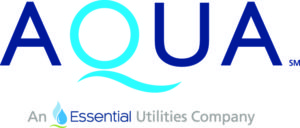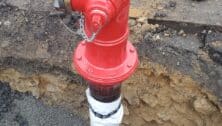Aqua Pennsylvania: The Cost of Service

 The post WWII economy, between 1945 and 1960, was a time of significant economic growth in the United States. Our country and its many cities and suburbs saw a return of prosperity that led to a housing boom. This growth caused communities to expand into new areas creating a need for more services including drinking water and wastewater service. Today, the pipes, wells and treatment plants that spurred that growth have exhausted their service and now require costly repair or replacement.
The post WWII economy, between 1945 and 1960, was a time of significant economic growth in the United States. Our country and its many cities and suburbs saw a return of prosperity that led to a housing boom. This growth caused communities to expand into new areas creating a need for more services including drinking water and wastewater service. Today, the pipes, wells and treatment plants that spurred that growth have exhausted their service and now require costly repair or replacement.
This puts into perspective comments from my last post when I discussed how much of the water infrastructure in the United States has been in operation for more than 100 years and is near or beyond its useful life. That is the point of the American Society of Civil Engineers (ASCE)’s most recent Infrastructure Report Card in 2017, when it graded America’s drinking water infrastructure a D, and its wastewater a D+. Just like when we were in school, these grades are unacceptable.
The ASCE report states that the water and wastewater investment needs for the U.S. for the years 2016-2025 is $150 billion, which leaves our country with a $105 billion investment gap. That is why Aqua Pennsylvania’s parent company, Essential Utilities, plans to invest $495 million per year over the next five years to improve community drinking water and wastewater systems across its eight states. These investments are necessary to replace this old, failing infrastructure and help ensure critical infrastructure is maintained so that customers receive safe, quality drinking water and reliable water and wastewater service, not only for our generation, but for our children and grandchildren.
We understand that this reconstruction often requires detours and other inconveniences, which oftentimes evokes angst from residents including concern about the impact of these investments on water and wastewater rates. We are also sensitive to rate impact from our construction but let me offer the following for you to consider. Usually, when we think about bills, we automatically think lower is better, right? Not so fast. We know all too well that deeply discounted purchases do not always translate to a good product or positive experience. Aqua’s team of water professionals who deliver drinking water to our customers knows all too well the life-sustaining nature of our service. We know that lower rates often indicate deferred maintenance and old outdated facilities, which can lead to service interruptions, water quality violations and wastewater discharge violations that are at the heart of ACSE’s failing infrastructure grades.
Many of the water and wastewater systems Aqua Pennsylvania purchases are in varying states of despair due to poor construction practices during initial installation or many years of deferred infrastructure investment. As you might surmise, this neglect enables artificially and temporarily lower rates. However, as time goes on, deferred maintenance can worsen, threatening service and resulting in the need for more expensive replacement. Often, municipal systems must juggle the priorities of education, public safety and recreation with the needs of their water and wastewater systems — most of which is buried underground and out of plain sight. Then, when faced with significant compliance issues and the staggering investment required after years of prioritizing other needs, municipal leaders often look to Aqua for our expertise in rehabilitating systems so customers can continue to have reliable drinking water and wastewater service.
Aqua Pennsylvania invests more than $300 million annually to ensure the continuous delivery of quality drinking water and reliable water and wastewater services. Aqua’s cost of service includes construction costs and operating expenses that are deemed reasonable and necessary by the Pennsylvania Public Utility Commission only after it completes an in-depth base rate case: a legal proceeding, overseen by an administrative law judge, that typically takes nine months. The rate case application which takes months to create can include thousands of pages of supporting documentation. The process invites public participation as all customers are notified by mail of the pending application and all public hearings are advertised in newspapers and social media. How does that process compare with your current service?
The results of our investments are reflected in the compliance records of Essential Utilities Inc. water utilities versus average water systems in the United States. In 2019, 37 percent of community water systems in the United States experienced a U.S. Environmental Protection Agency violation and 9.2 percent of systems had health-based violations. In 2019, Aqua Pennsylvania had no water quality violations.
We take very seriously the responsibility municipalities entrust to us to serve their residents and improve the infrastructure necessary to do so. This year, Aqua Pennsylvania has $316 million in planned infrastructure improvement projects throughout the Commonwealth to ensure we are delivering safe drinking water and reliable service to our customers now, and for generations to come.
________________________________________________________________________________________________
ABOUT THE AUTHORS
Marc Lucca is the president of Aqua Pennsylvania, which serves approximately 1.4 million people in 32 counties throughout the Commonwealth of Pennsylvania.
Bill Packer is a vice president, controller of Aqua Pennsylvania, which serves approximately 1.4 million people in 32 counties throughout the Commonwealth of Pennsylvania, and Aqua New Jersey, which provides water and wastewater service to more than 182,000 people in 31 municipalities.
________________________________________________________________________________________________
Connect With Your Community
Subscribe to stay informed!
"*" indicates required fields






![95000-1023_ACJ_BannerAd[1]](https://vista.today/wp-content/uploads/2023/03/95000-1023_ACJ_BannerAd1.jpg)








































